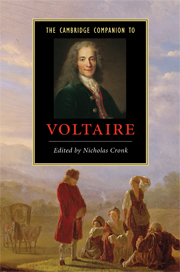Book contents
- Frontmatter
- Introduction
- 1 The making of a name: a life of Voltaire
- 2 Voltaire and authorship
- 3 Voltaire: philosopher or philosophe?
- 4 Voltaire and clandestine manuscripts
- 5 Voltaire and the myth of England
- 6 Voltaire’s masks: theatre and theatricality
- 7 Voltaire as story-teller
- 8 Candide
- 9 Voltaire and history
- 10 Voltaire’s correspondence
- 11 Voltaire: pamphlets and polemic
- 12 Voltaire and the politics of toleration
- 13 Voltaire and the Bible
- 14 The Voltaire effect
- Further reading
- Index
12 - Voltaire and the politics of toleration
Published online by Cambridge University Press: 28 May 2009
- Frontmatter
- Introduction
- 1 The making of a name: a life of Voltaire
- 2 Voltaire and authorship
- 3 Voltaire: philosopher or philosophe?
- 4 Voltaire and clandestine manuscripts
- 5 Voltaire and the myth of England
- 6 Voltaire’s masks: theatre and theatricality
- 7 Voltaire as story-teller
- 8 Candide
- 9 Voltaire and history
- 10 Voltaire’s correspondence
- 11 Voltaire: pamphlets and polemic
- 12 Voltaire and the politics of toleration
- 13 Voltaire and the Bible
- 14 The Voltaire effect
- Further reading
- Index
Summary
It would be an understandable mistake if, in seeking a working definition of the problem of toleration, we came to believe that it was essentially a matter for theological debate. Works of reference rarely explain that, in the eighteenth century, even the Church looked upon this theological issue as being, in parallel, a practical problem with distinct political ramifications. Similarly, Voltaire's own concern with toleration - all too easily linked with his campaign against l'Infâme (dogmatic, revealed religion in all its worst manifestations) - was always deeply political. Furthermore we cannot adequately define the political nature and above all the specificity of Voltaire's views on toleration with reference to Voltaire alone. He did not evolve in a self-sufficient vacuum. For example, his celebrated Traité sur la tolérance (1763) was long presented - even by the most reputable scholars - as though it was to be understood with exclusive reference to his campaign against l'Infame. A more appropriate reading takes account of the years 1751-62 which saw a concerted campaign for and against toleration within a particular political and economic framework where Voltaire responds belatedly to specific conservative proponents of the status quo. No investigation, therefore, into Voltaire's complex views can possibly dispense with some preliminary examination of the background against which those views evolved and to which they often ultimately proved to be a response.
- Type
- Chapter
- Information
- The Cambridge Companion to Voltaire , pp. 179 - 192Publisher: Cambridge University PressPrint publication year: 2009
- 5
- Cited by

